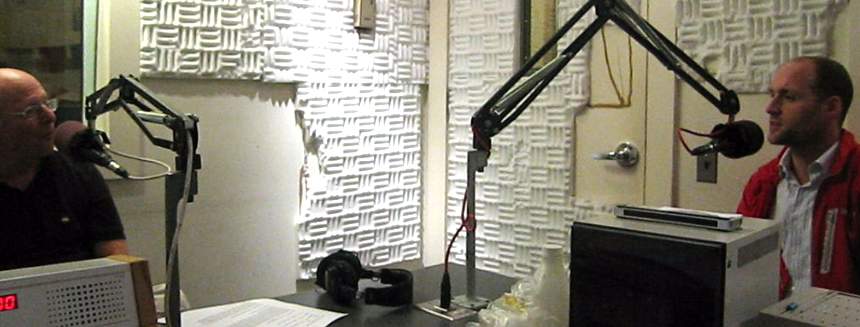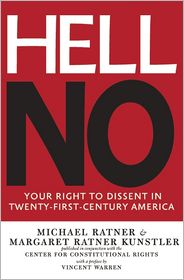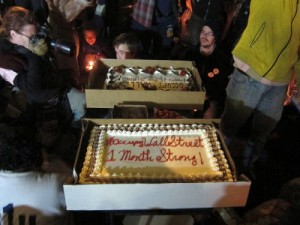Podcast: Play in new window | Download
Updates:
- Al-Awlaki’s Family members also killed and US Citizens.
- Who Killed Che? How The CIA Got Away With Murder
- New York Times: A Right To Sleep In Tents – Michael Ratner
—-
Occupy Wall St. – Think Tanks and Organizing
Like many protesters down at Liberty Plaza, Tim Weldon has been under employed for years. He’s got a Masters Degree, one in economic development and 10 years experience in international business. He’s now part of Occupy Wall St working with the think tank group. The first step is taking all the ideas and solutions generated from the movement and collating them into a more accessible format.
- The food is hit or miss, you cycle through, get in line, whatever is there at the time, that’s what you get.
- There’s sanitation, first aid, media press, PR. The group that I’m specifically on is the think tank.
- Similar to a lot of people, said, how do I fit in and what exactly is going on? Like most people I got down there and thought how do I fit in to where I most belong? So, I walked around for most of the day, I got to the stage to where I thought, what I would be good at and what could fit in here.
- Then I found some very like minded people who were thinking the same thing, to sort of create an opportunity for all of the ideas to be collected, organized and collated together. The think tank, we’re going to have four different receptacles for information.
- One will be from the park where we’ll have discussion groups on topics. We’re trying to develop a web platform within the NYCGA.net .
- We’re getting all walks of life, one of the best participants was a disabled man.
- The discussions have been so positive and energetic and we’re saying how can we take both of these ideas and forget about the established dichotomies and all this dogma that people are working with.
- Let’s go straight to us right here, let’s create a productive use of this information where everybody is happy.
- I found that everybody I’m working with open and wants to listen, wants to learn, the way most of the groups work is there’s no leaders. I like to draw differentiation between leaders and leadership.
- People are coming here after they’ve been setup and more streamline or coming here to get things more streamline. Take a step back, try to envision something different.
- Everybody seemed united around, well, they want it clean, lets get things clean.
- People were doing what had to be done and getting things done, but there was a subtle apprehension there, what’s going to happen tomorrow? How serious is it going to be? How much are we going to have to fight, not in a physical sense but in all sort of senses for this space?
- Most of the country can get behind the fact, whether your left or right, whatever it is, you’ve got some apprehension about what’s going on in the country right now and that’s what we’re trying to voice.
- Holding that space is really important to the movement.
- Maintaining that park is very important because it is the symbol. You control us in every other aspect of our lives perhaps, but you don’t control us here.
- I left my job last week, this to me is the movement of our generation.
Guest – Tim Weldon is from upstate New York. He quit his job to dedicate his time to help the Occupy Wall Street movement. Specifically, Tim is working with the think tank group, pulling together ideas and solutions pouring in from around the country and making them more accessible to media and others. Tim has a Master’s Degrees in economic development. He also has 10 years experience in international business.
—
Occupy Wall Street: Attorney Margaret Ratner-Kunstler Part 2
We continue the “know your rights” discussion on the Occupy Wall St protests, encampments and demonstrations. Last week we talked about how the NYPD collected intelligence data from protesters. When more than 800 people on the Brooklyn Bridge were arrested a few weeks ago, that event was more about getting protester names and pedigree information into databases says attorney Margaret Ratner-Kunstler with the National Lawyers Guild. Meanwhile students from 90 colleges and universities are protesting the price of education, being saddled with student loan debt and more. There are many aspects to knowing your rights as a demonstrator and we’ll discuss more details today with returning guest attorney Margaret Ratner Kunstler.
Attorney Margaret Ratner-Kunslter:
- You can be anywhere to express your first amendment rights. I think occupation is a new first amendment right.
- The occupation movement is relatively new and we haven’t really tested it in the federal courts or state courts and I think we have a good opportunity to do that. They haven’t got people out of the park because when they threatened to do so, the number of people swelled from about 1000 to 6000.
- I think it was a question of mass support for the demonstration that prevented the police from clearing the park.
- Seattle was a successful protest (1999) it interfered with delegates going to the convention center and it was a very embarrassing thing for the police because it was an international conference.
- Kettling is those big iron fences, they put people in these fenced areas to keep them separated so they can be crowd control.
- By the time Michael and I finished this book, we were saying, oh, they’re never going to be able to demonstrate again. But lo and behold, a new form of demonstrations is upon us, and its just thrilling.
- The police officer who pepper sprayed the young woman, lost ten vacation days.
- That was the immediate result after Seattle, there were fusion centers. Those are centers where the FBI and local police get together and collect information.
- Every time they hear of a demonstration, they try to prevent it, they have many ways to dissuade people from coming to demonstrations.
- Militarization of the police: It was no longer a family occupation to protest against the war, it was a dangerous thing to do. You got stuck in a pen and you couldn’t get out.
Guest – Magaret Ratner-Kunstler, an attorney in private practice. As education director at the Center for Constitutional Rights, she originated the Movement Support Network and authored “If an Agent Knocks.” Margaret is the President of the William Moses Kunstler Fund for Racial Justice, a foundation established in 1995 in the memory of her late husband to combat racism in the criminal justice system.
——————————-


